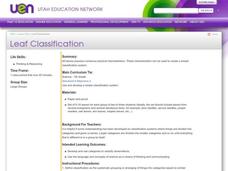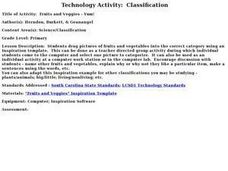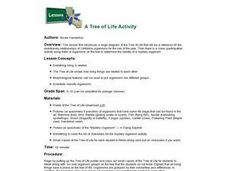Curated OER
Classification #3
In this classification worksheet, students read 12 groups of words and select the appropriate word that does belong with the other 3 words.
Curated OER
Putting Things in Place
In this classification worksheet, students read the words from the word box and then write them under the correct category of 'things that fly,' 'things that are hot,' or 'things that are soft.'
Curated OER
Classifying Life
In this classifying life worksheet, students review the 5 kingdoms of organisms by completing 10 matching and 7 fill in the blank questions.
Curated OER
Kingdoms of Life
In this kingdoms of life worksheet, students complete a graphic organizer by filling in the next 8 classification levels under prokaryotes and eukaryotes.
Curated OER
Describing the Living World
In this living world worksheet, students review classification categories, organism adaptations, and organisms' basic needs. This worksheet has 7 matching, 7 true or false, 2 multiple choice, and 3 short answer questions.
Curated OER
What Animals Are Mammals And Birds?
In this classification worksheet, students will brainstorm animals and list them on the graphic organizer as either a mammal or a bird.
Curated OER
Organizing Life
For this classification worksheet, learners will review vocabulary words associated with the organization of living things which includes kingdom, phylum, class, order, family, genus, and species. This worksheet has 5 fill in the blank...
Curated OER
Using a Flow Chart for Classification
For this flow chart worksheet, students learn to use flow charts for classification of numbers, geometric shapes and animals. Students follow the directions and fill out flow charts to work out 20 answers. This is an online activity that...
Curated OER
What is Classification?
In this classification instructional activity, students describe the difference between Homo erectus and Homo sapiens. Then they define taxonomy and explain what was wrong with Aristotle's method of classification. Students also describe...
Curated OER
The Rock Cycle
In this rock cycle activity, students copy the table illustrated for data and observations of rock samples. Then they examine the rock samples observing the characteristics and the arrangement of grains in each. Students then record...
Curated OER
How Things Taste (Pieces)
In this worksheet, students cut and color 10 foods. Students classify them according to their taste and paste in the right space. This is intended to be used with another worksheet.
Curated OER
An Introduction to Dichotomous Keys
Young scholars pretend to be shark biologists employed by the National Oceanic and Atmospheric Administration (NOAA) who have been flown into the coastal city of Sao Luis in Brazil because locals have noticed an unidentified shark at...
Curated OER
Leaf Classification
Seventh graders work together to develop a leaf classification system. In groups, they are given a set of leaves and sort them based on their characteristics. They share their new classification system with the class and answer any...
Curated OER
Fruits and Veggies - Yum!
Students use Inspiration to drag pictures of fruits and vegetables into the correct category. They discuss the name of other fruits and vegetables. They explain why or why not they like that particular fruit or vegetable. Students...
Curated OER
Minerals and Rocks
Students identify and interpret various minerals and discover how to identify and classify them. They identify and discuss how people describe objects and how scientists describe objects. From there, students look at a set of common...
Curated OER
Classified Information - Part 1: Shapes
Third graders investigate how and why scientists use classification. They discuss classification strategies using animals, and as a class fill in a flowchart with their responses. Next, in small groups they cut out a variety of shapes...
Curated OER
Species Diversity and Phylogeny
Students explore the classification system of organisms: taxonomy. They examine prepared slides of Protozoans and record information on a Taxonomy Recording Sheet. Two additional classifying activities are also included in this lesson.
Curated OER
What Kind Of Mammal Is It?
Learners describe the characteristics of a mammal. They also differentiate between a companion and a wild animal. The lesson plan has an assessment included in it. They have a discussion to tap prior knowledge about what a mammal is.
Curated OER
Look Up - Birds
Students investigate the concept of birds. They identify five different types of birds and name the characteristics that make them different than other living things. Students also name the different parts of the bird and how they are...
Curated OER
Farm Products Help Me Grow
Students view a display of empty food containers (or illustrations). They select a food and decide as a class if it has an animal or plant origin. Students view a display of common farm animals that are commonly eaten (cow, pig, chicken,...
Curated OER
"Zoophyla"
Ninth graders gain an understanding of organims based on charateristics. They study about Kingdom Animalia and use technology to present knowledge of phyla. Finally, they create a new animal species of their own. When others present,...
Curated OER
A Tree of Life Activity
High schoolers solve a mystery of the identification of a unknown organism by comparing its morphological characteristics to those in a tree of life classification poster. They compare the observable characteristics of the specimen and...
Curated OER
An Automobile Phylogenetic Tree
Students construct a phylogenetic tree for various automobiles and trucks after considering important characteristics of these "organisms". They work in small groups to construct the trees and complete a set of questions then they...
Curated OER
Studying Species By Examining the Evolution of the Canidae Family
Pupils read an article on the characteristics of wolves and dogs then complete a phylogenetic tree of the canid family. They then write an essay justifying why or why not wolves and dogs should be classified as different species.

























